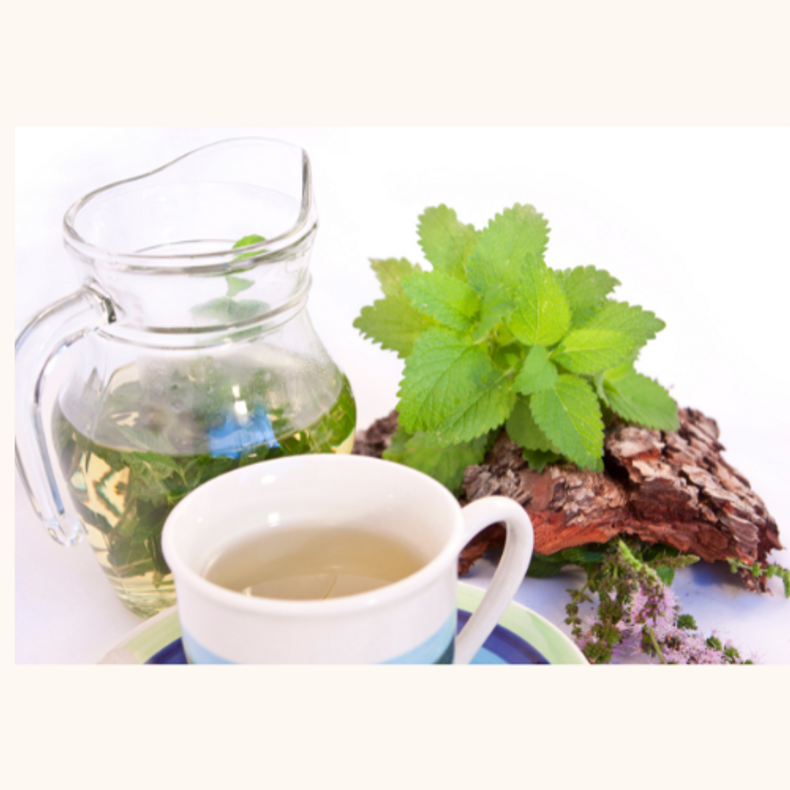Lemon balm, scientifically known as Melissa officinalis, is a fragrant and versatile herb that has been treasured for centuries for its myriad of health benefits. Native to the Mediterranean region, lemon balm belongs to the mint family and is renowned for its lemony aroma and refreshing flavor. Beyond its culinary uses, lemon balm has been celebrated for its therapeutic properties, making it a valuable addition to any herbal remedy arsenal. Let's explore the incredible benefits that lemon balm has to offer.
- Calms the Mind and Soothes Anxiety: Lemon balm has long been prized for its ability to promote relaxation and alleviate stress and anxiety. Studies have shown that lemon balm contains compounds that help calm the mind and reduce feelings of nervousness and agitation. Whether brewed into a soothing tea or added to aromatherapy blends, lemon balm can be a valuable ally in managing daily stressors.
- Supports Cognitive Function: Research suggests that lemon balm may have cognitive-enhancing properties, making it beneficial for brain health. Some studies have indicated that lemon balm extract may improve memory, concentration, and overall cognitive function, potentially offering support for those experiencing age-related cognitive decline.
- Promotes Quality Sleep: Lemon balm's calming effects extend to improving sleep quality and combating insomnia. By reducing anxiety and promoting relaxation, lemon balm can help individuals achieve a restful night's sleep. Enjoying a cup of lemon balm tea before bedtime can be a gentle and natural way to unwind and prepare for sleep.
- Aids Digestive Health: Traditionally used as a digestive aid, lemon balm can help soothe digestive discomfort and alleviate symptoms such as bloating, gas, and indigestion. Its carminative properties help relax the digestive tract and reduce spasms, making it particularly beneficial for those with irritable bowel syndrome (IBS) or other gastrointestinal issues.
- Antioxidant Protection: Lemon balm is rich in antioxidants, compounds that help protect the body against oxidative stress and cellular damage caused by free radicals. Regular consumption of lemon balm may help support overall health and longevity by neutralizing harmful free radicals and reducing the risk of chronic diseases.
- Skin Care: Due to its antimicrobial and anti-inflammatory properties, lemon balm is often used topically to promote skin health. It can help soothe irritations, reduce redness, and alleviate symptoms of conditions such as eczema and cold sores. Incorporating lemon balm-infused skincare products or applying diluted lemon balm essential oil to the skin can help maintain a clear and healthy complexion.
- Natural Antiviral and Immune Support: Lemon balm exhibits potent antiviral properties, particularly against herpes simplex virus (HSV), which causes cold sores. Additionally, its immune-modulating effects may help strengthen the body's defenses against infections and bolster overall immune function, making it a valuable ally during cold and flu season.
Incorporating lemon balm into your daily routine can offer a multitude of health benefits, whether enjoyed as a delicious tea, added to culinary creations, or used in natural remedies and skincare products. However, as with any herbal supplement, it's essential to consult with a healthcare professional, especially if you are pregnant, nursing, or taking medications, to ensure its safe and appropriate use. Embrace the natural wonders of lemon balm and experience the revitalizing power of this remarkable herb. I incorporate lemon balm into my diet in tea form with CBD honey or tincture. The two work well together for me and I hope they help you too.
Warning: Lemon Balm should not be used if you are on thyroid medication. Always consult your physician for advice before starting any new supplement. This is for informational purposes only and is not intended to diagnose, treat, prevent or cure any disease.
Sources:
Apelian, PHD, Dr. Nicole and Davis, Claude, The Lost Book of Herbal Remedies. Copyrighted by Global Brother SRL, 2019
The Lost Remedies Academy by Dr. Nicole Apelian, Ph. D.
